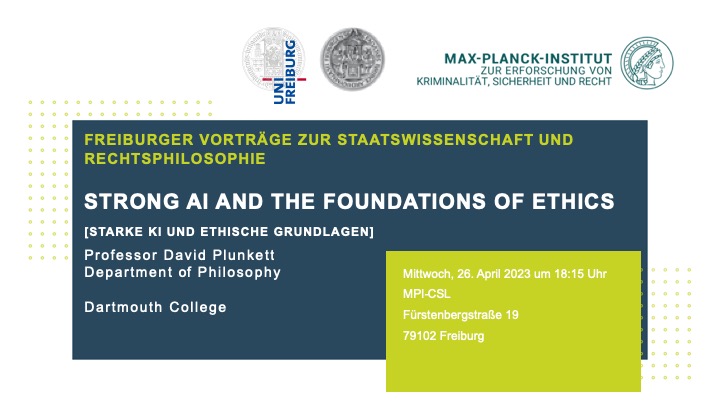Vortrag „Strong AI and the foundations of ethics“: Professor David Plunkett, Dartmouth College, berichtet von seiner Forschung zu Künstlicher Intelligenz und deren ethischen Grundlagen.
Das Thema Künstliche Intelligenz ist aus der heutigen Zeit kaum mehr wegzudenken; Fragen über deren Zukunft, die Chancen, die sie eröffnet und Probleme, die sich ergeben werden, spielen in der aktuellen Debatte eine große Rolle. Sicher ist: Künstliche Intelligenz wird uns in Zukunft in sämtlichen Lebensbereichen vermehrt begegnen. Dabei soll uns die Künstliche Intelligenz nicht nur bei Problemen im Alltag oder im Arbeitsleben aushelfen, sondern auch selbstständig evaluative Überlegungen, wie die Frage nach gut und böse, richtig oder falsch, ja oder nein, anstellen.
Hier setzt die Forschung an, von der Professor David Plunkett am Mittwoch, 26. April 2023, in der Veranstaltungsreihe „Freiburger Vorträge zu Staatswissenschaft und Rechtsphilosophie“ berichten wird. Plunkett hat sich die Frage gestellt, welche Auswirkungen es haben könnte, wenn nicht mehr der aufgrund seiner Gefühle, Gedanken und Sozialisierung handelnde Mensch, sondern eine „intelligentere“ Instanz über die großen Fragen unserer Gesellschaft entscheiden würde. Unter Betrachtung zahlreicher möglicher Szenarien setzt er sich mit den Chancen und Risiken auseinander, die sich in ethischer Hinsicht ergeben können und gibt einen Ausblick darauf, wie diese möglicherweise in Zukunft zu beurteilen sind.
Der Vortrag findet um 18:15 Uhr am Max-Planck-Institut zur Erforschung von Kriminalität, Sicherheit und Recht im Seminarraum Fürstenbergstraße 19, 79102 Freiburg, statt. Veranstalter sind das Institut für Staatswissenschaft und Rechtsphilosophie der Rechtswissenschaftlichen Fakultät und das Max-Planck-Institut. Eine Anmeldung wird erbeten an c.hillemanns@csl.mpg.de.
David Plunkett ist Professor für Philosophie am Dartmouth College in den Vereinigten Staaten. Zu seinen Forschungsschwerpunkten gehören Ethik (insbesondere Metaethik), Rechtsphilosophie, Sprachphilosophie, philosophische Methodologie, Erkenntnistheorie und soziale/politische Philosophie.
It is hard to imagine today without the topic of artificial intelligence; questions about its future, the opportunities it opens up and problems that will arise play a major role in the current debate. One thing is certain: in the future, we will increasingly encounter artificial intelligence in all areas of life. Artificial intelligence will not only help us with problems in everyday life or at work, but will also be able to make independent evaluative decisions, such as good and evil, right or wrong, yes or no. This is where research comes in.
This is where the research comes in, which Professor David Plunkett will report on Wednesday, April 26 2023, in the event series "Freiburg Lectures on Political Science and Philosophy of Law." Plunkett has asked himself what the implications might be if it were no longer humans acting on the basis of their feelings, thoughts, and socialization, but a more "intelligent" entity deciding on the big questions of our society. Considering numerous possible scenarios, he deals with the opportunities and risks that could arise from an ethical point of view and gives an outlook on how these might be assessed in the future.
The lecture will take place at 6:15 p.m. at the Max Planck Institute for the Study of Crime, Security and Law in the seminar room at Fürstenbergstrasse 19, 79102 Freiburg, Germany. Organizers are the Institute for Political Science and Philosophy of Law of the Faculty of Law and the Max Planck Institute. Registration is requested to c.hillemanns@csl.mpg.de.
David Plunkett is a professor of philosophy at Dartmouth College in the United States. His research interests include ethics (especially metaethics), philosophy of law, philosophy of language, philosophical methodology, epistemology, and social/political philosophy.


